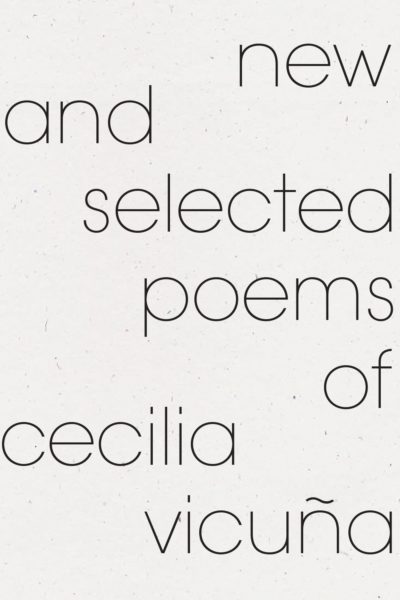New and Selected Poems of Cecilia VicuÑa
by Cecilia Vicuña, edited and translated by Rosa Alcalá
reviewed by Christopher Soto
Poet, activist, and visual/performance artist Cecilia Vicuña’s New and Selected Poems brings together decades of her work, beginning with writings from 1966—with selections from Stupid Diary/Sabor a Mí—and continuing until the current day, over fifty years later. The collection is credited to Rosa Alcalá, the primary editor and translator of Vicuña’s work, with additional translations contributed by eight other translators. Alcalá has translated Vicuña’s work for years, including the published collection Spit Temple: The Selected Performances of Cecilia Vicuña. In the acknowledgements, Vicuña thanks Alcalá “for a lifetime of poetic work alongside mine.”
The book’s introduction from Daniel Borzutzky, National Book Award-winning Latinx poet, contextualizes Vicuña as part of a transnational literary avant-garde. Born in Chile, Vicuña fled her country of birth shortly before the dictatorship of General Pinochet. She lived in London and Bogotá before coming to the US, and has lived in exile in the United States for over thirty years.
The New and Selected Poems includes, in addition to Vicuña’s previously published writings, the author’s photos, images of her art installations, drawings, and handwritten performance notes. Vicuña’s poems in this collection are usually presented in the original Spanish on the left page with Alcalá’s English translation on the facing page. The poems also occasionally contain words in Spanglish, the indigenous South American languages of Quechua and Aymara, and a language of Vicuña’s own creation called PALABRARmas. In an author’s note on PALABRARmas, she writes that these words “were born from a vision in which individual words opened up to reveal their inner associations, allowing ancient and newborn metaphors to come to light.”
Vicuña is known for her attention to indigenous history and artistic forms, as evident in her 1997 book QUIPOem/The Precarious: The Art and Poetry of Cecilia Vicuña (also included in this collection), written as an homage to the indigenous people of the Andes who created complex recording devices made of knotted cords called quipus for reading and writing. The quipu system was in use for thousands of years until European colonizers banned it. Many of these poems reflect on weaving and quipus, such as in “The Origin of Weaving”:
weave
from weban, wefta, Old English
weft, cross thread
web
the coming out
of the cross-star
the interlacing
of warp and weft
to imagine the first cross
intertwining of branches and twigs
to make a nest
to give birth
Many of the poems in this collection have unique shapes that are reminiscent of concrete poetry in their dance between content and form. The content of the poems weaves us together, returning us to our forgotten selves and too-often forgotten histories; the form is as expansive and shape-shifting as a cloud.
Not merely a nod to Vicuña’s life accomplishments as a poet, this new collection is a celebration of the poet’s life lived fully as an artist and advocate—another a knot in the quipu she has been weaving her entire life. This is a life spent advocating for indigenous rights, migrant rights, women, the environment, love, kindness, and socialism. Her work transcends formal constraints of genre and moves beyond the boundaries of the nation-state. In the poem “Research Project,” Vicuña writes on many of those subjects at once:
[ … ] we’ll kiss
every person
we meet
to determine
who does it better
and learn accordingly
from their technique,
we’ll practice it
and without delay bring it back
to our socialist country,
which will be land of The Kissers.
The New and Selected Poems also includes work recovered from “two thousand pages of writing from the late ‘60s found in the bottom of a trunk.” However, for Vicuña, the poem is not just an object that can be found or lost; it can also be a spirit, experience, or protest exuded by the poet. The written word on the page is only the smallest remnant of the poem, which is really the life, or shared life, of its poet. As such, Vicuña’s poems are deeply spiritual and intimate, like the line in the middle of her long poem “Amada Amiga/Beloved Friend,” where she writes, “It’s me I’m tired of.”
Praise be to the New and Selected Poems of Cecilia Vicuña for bringing us the work of one of the most authentic and multifaceted voices in contemporary poetry. Vicuña is an artistic powerhouse, the embodiment of creative exploration and political resistance. This collection proves that Vicuña’s work is about the communal process of living and art-making, and not at all about the production of a solitary artifact for the archives.
Published on August 13, 2019

